杭州师范大学中国语言文学综合知识2019--2020年考研专业课真题
- 格式:pdf
- 大小:472.24 KB
- 文档页数:9
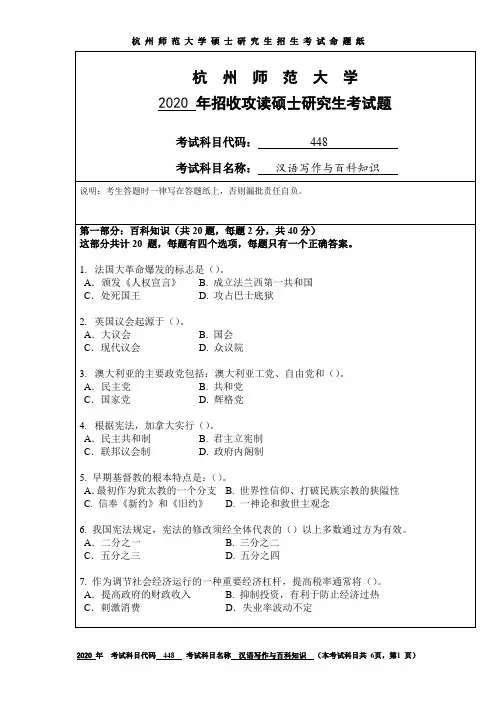
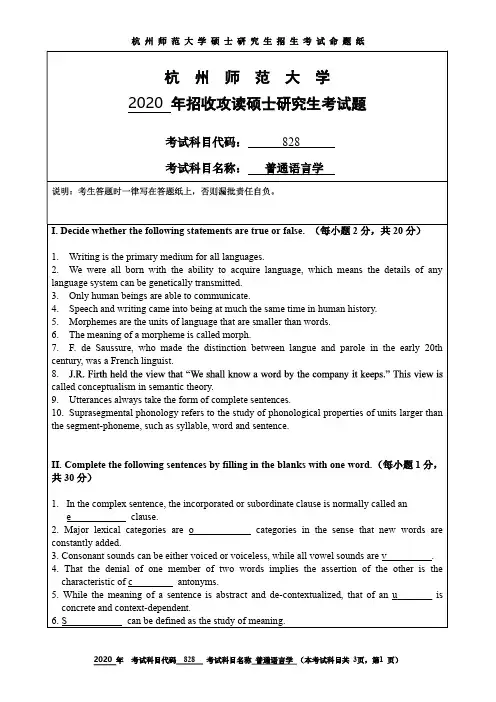
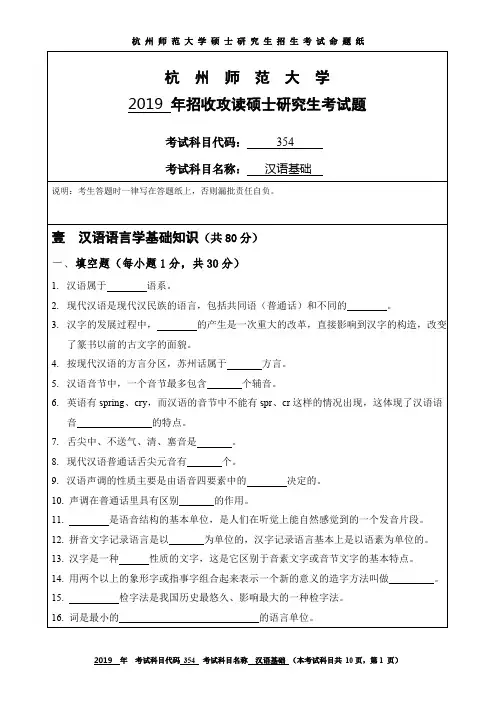
杭州师范大学硕士研究生招生考试命题纸
杭州师范大学
2019年招收攻读硕士研究生考试题
考试科目代码:354
考试科目名称:汉语基础
说明:考生答题时一律写在答题纸上,否则漏批责任自负。
壹汉语语言学基础知识(共80分)
一、填空题(每小题1分,共30分)
1. 汉语属于语系。
2. 现代汉语是现代汉民族的语言,包括共同语(普通话)和不同的。
3. 汉字的发展过程中,的产生是一次重大的改革,直接影响到汉字的构造,改变
了篆书以前的古文字的面貌。
4. 按现代汉语的方言分区,苏州话属于方言。
5. 汉语音节中,一个音节最多包含个辅音。
6. 英语有spring、cry,而汉语的音节中不能有spr、cr这样的情况出现,这体现了汉语语
音的特点。
7. 舌尖中、不送气、清、塞音是。
8. 现代汉语普通话舌尖元音有个。
9. 汉语声调的性质主要是由语音四要素中的决定的。
10. 声调在普通话里具有区别的作用。
11. 是语音结构的基本单位,是人们在听觉上能自然感觉到的一个发音片段。
12. 拼音文字记录语言是以为单位的,汉字记录语言基本上是以语素为单位的。
13. 汉字是一种性质的文字,这是它区别于音素文字或音节文字的基本特点。
14. 用两个以上的象形字或指事字组合起来表示一个新的意义的造字方法叫做。
15. 检字法是我国历史最悠久、影响最大的一种检字法。
16. 词是最小的的语言单位。
2019年考试科目代码354 考试科目名称汉语基础(本考试科目共10页,第1 页)。
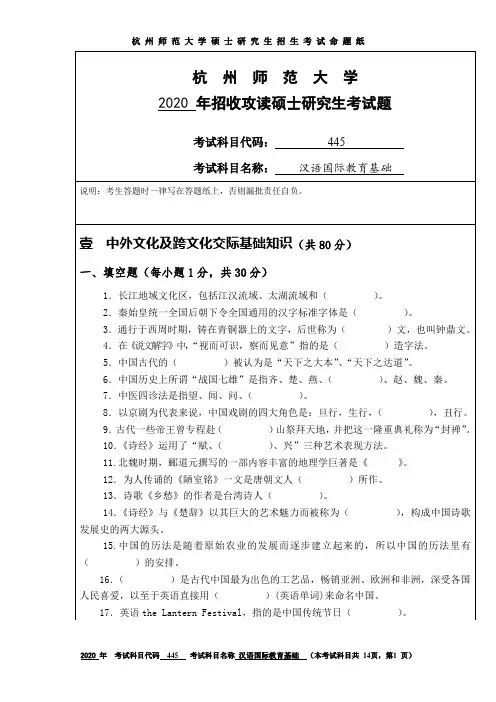
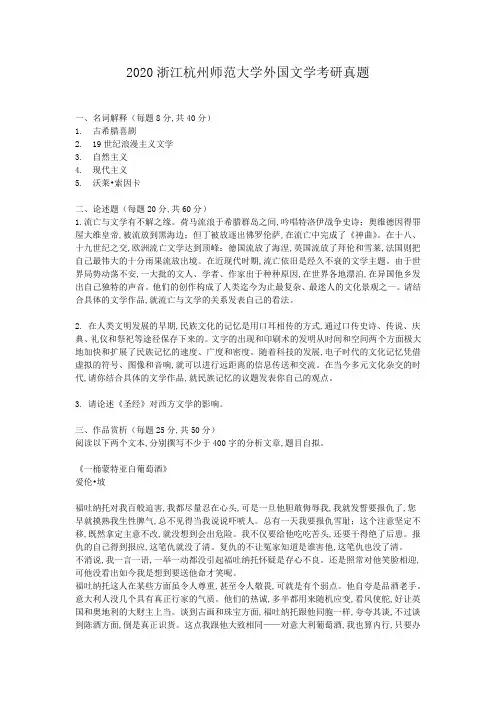
2020浙江杭州师范大学外国文学考研真题一、名词解释(每题8分,共40分)1. 古希腊喜剧2. 19世纪浪漫主义文学3. 自然主义4. 现代主义5. 沃莱•索因卡二、论述题(每题20分,共60分)1.流亡与文学有不解之缘。
荷马流浪于希腊群岛之间,吟唱特洛伊战争史诗;奥维德因得罪屋大维皇帝,被流放到黑海边;但丁被放逐出佛罗伦萨,在流亡中完成了《神曲》。
在十八、十九世纪之交,欧洲流亡文学达到顶峰:德国流放了海涅,英国流放了拜伦和雪莱,法国则把自己最伟大的十分雨果流放出境。
在近现代时期,流亡依旧是经久不衰的文学主题。
由于世界局势动荡不安,一大批的文人、学者、作家出于种种原因,在世界各地漂泊,在异国他乡发出自己独特的声音。
他们的创作构成了人类迄今为止最复杂、最迷人的文化景观之一。
请结合具体的文学作品,就流亡与文学的关系发表自己的看法。
2. 在人类文明发展的早期,民族文化的记忆是用口耳相传的方式,通过口传史诗、传说、庆典、礼仪和祭祀等途径保存下来的。
文字的出现和印刷术的发明从时间和空间两个方面极大地加快和扩展了民族记忆的速度、广度和密度。
随着科技的发展,电子时代的文化记忆凭借虚拟的符号、图像和音响,就可以进行远距离的信息传送和交流。
在当今多元文化杂交的时代,请你结合具体的文学作品,就民族记忆的议题发表你自己的观点。
3. 请论述《圣经》对西方文学的影响。
三、作品赏析(每题25分,共50分)阅读以下两个文本,分别撰写不少于400字的分析文章,题目自拟。
《一桶蒙特亚白葡萄酒》爱伦•坡福吐纳托对我百般迫害,我都尽量忍在心头,可是一旦他胆敢侮辱我,我就发誓要报仇了,您早就摸熟我生性脾气,总不见得当我说说吓唬人。
总有一天我要报仇雪耻;这个注意坚定不移,既然拿定主意不改,就没想到会出危险。
我不仅要给他吃吃苦头,还要干得绝了后患。
报仇的自己得到报应,这笔仇就没了清。
复仇的不让冤家知道是谁害他,这笔仇也没了清。
不消说,我一言一语,一举一动都没引起福吐纳托怀疑是存心不良。
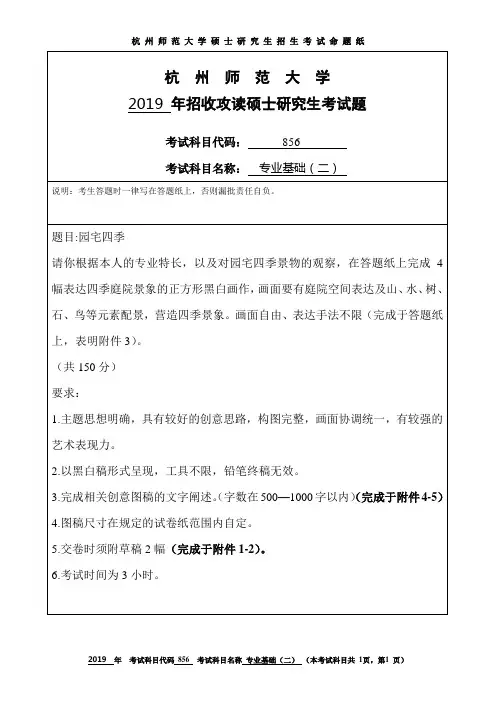
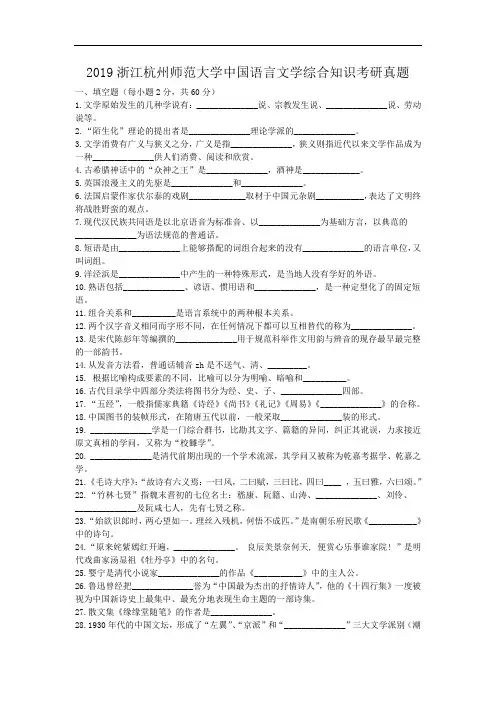
2019浙江杭州师范大学中国语言文学综合知识考研真题一、填空题(每小题2分,共60分)1.文学原始发生的几种学说有:______________说、宗教发生说、______________说、劳动说等。
2.“陌生化”理论的提出者是______________理论学派的______________。
3.文学消费有广义与狭义之分,广义是指______________,狭义则指近代以来文学作品成为一种______________供人们消费、阅读和欣赏。
4.古希腊神话中的“众神之王”是______________,酒神是_____________。
5.英国浪漫主义的先驱是______________和______________。
6.法国启蒙作家伏尔泰的戏剧_____________取材于中国元杂剧___________,表达了文明终将战胜野蛮的观点。
7.现代汉民族共同语是以北京语音为标准音、以______________为基础方言,以典范的______________为语法规范的普通话。
8.短语是由______________上能够搭配的词组合起来的没有______________的语言单位,又叫词组。
9.洋泾浜是______________中产生的一种特殊形式,是当地人没有学好的外语。
10.熟语包括______________、谚语、惯用语和______________,是一种定型化了的固定短语。
11.组合关系和__________是语言系统中的两种根本关系。
12.两个汉字音义相同而字形不同,在任何情况下都可以互相替代的称为______________。
13.是宋代陈彭年等编撰的______________用于规范科举作文用韵与辨音的现存最早最完整的一部韵书。
14.从发音方法看,普通话辅音zh是不送气、清、_________。
15. 根据比喻构成要素的不同,比喻可以分为明喻、暗喻和__________。
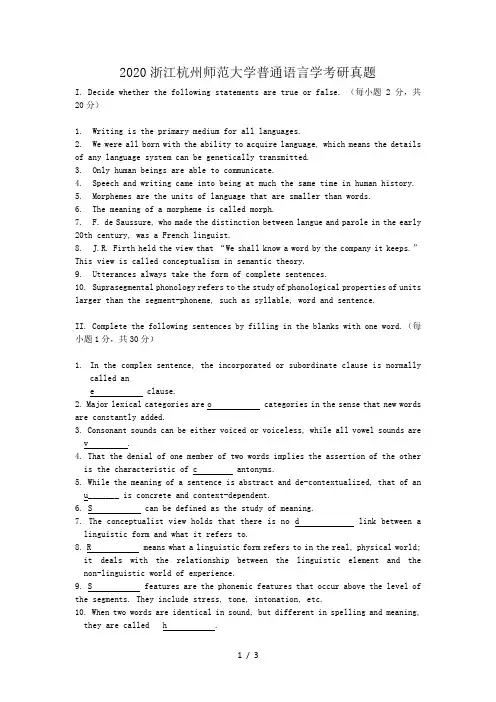
2020浙江杭州师范大学普通语言学考研真题I. Decide whether the following statements are true or false. (每小题2分,共20分)1. Writing is the primary medium for all languages.2. We were all born with the ability to acquire language, which means the details of any language system can be genetically transmitted.3. Only human beings are able to communicate.4. Speech and writing came into being at much the same time in human history.5. Morphemes are the units of language that are smaller than words.6. The meaning of a morpheme is called morph.7. F. de Saussure, who made the distinction between langue and parole in the early 20th century, was a French linguist.8. J.R. Firth held the view that “We shall know a word by the company it keeps.” This view is called conceptualism in semantic theory.9. Utterances always take the form of complete sentences.10. Suprasegmental phonology refers to the study of phonological properties of units larger than the segment-phoneme, such as syllable, word and sentence.II. Complete the following sentences by filling in the blanks with one word.(每小题1分,共30分)1.In the complex sentence, the incorporated or subordinate clause is normallycalled ane clause.2. Major lexical categories are o categories in the sense that new words are constantly added.3. Consonant sounds can be either voiced or voiceless, while all vowel sounds are v .4. That the denial of one member of two words implies the assertion of the other is the characteristic of c antonyms.5. While the meaning of a sentence is abstract and de-contextualized, that of an u_______ is concrete and context-dependent.6. S can be defined as the study of meaning.7. The conceptualist view holds that there is no d link between a linguistic form and what it refers to.8. R means what a linguistic form refers to in the real, physical world; it deals with the relationship between the linguistic element and the non-linguistic world of experience.9. S features are the phonemic features that occur above the level of the segments. They include stress, tone, intonation, etc.10. When two words are identical in sound, but different in spelling and meaning, they are called h .11. R opposites are pairs of words that exhibit the reversal of arelationship between the two items.12. C analysis is based upon the belief that the meaning of a word canbe divided into meaning components.13. Whether a sentence is semantically meaningful is governed by rules called s restrictions, which are constraints on what lexical items can go with what others.14. An a is a logical participant in a predication, largely identicalwith the nominal element(s) in a sentence.15. According to the n theory of meaning, the words in a language aretaken to be labels of the objects they stand for.16. What essentially distinguishes s and pragmatics is whether in thestudy of meaning the context of use is considered.17. The notion of c is essential to the pragmatic study of language.18. If we think of a sentence as what people actually utter in the course of communication, it becomes an u .19. In any language words can be used in new ways to mean new things and can be combinedinto innumerable sentences based on limited rules. This feature is usually termedp .20. C were statements that either state or describe, and were thusverifiable.21. P were sentences that did not state a fact or describe a state, andwere not verifiable.22. A c is to commit the speaker himself to some future course of action.23. An e is to express feelings or attitude towards an existing state.24. A c sentence contains two clauses joined by a linking word, such as"and", "but", "or".25. In making conversation, the general principle that all participants are expectedto observe is called the C Principle proposed by J. Grice.26. Chomsky defines “competence” as the ideal user’s k of the rulesof his language.27. Langue refers to the a linguistic system shared by all the membersof a speech community while the parole is the concrete use of the conventions andapplication of the rules.28. D is one of the design features of human language which refers tothe phenomenon that language consists of two levels: a lower level of meaninglessindividual sounds and a higher level of meaningful units.29. A s may be a noun or a noun phrase in a sentence that usually precedesthe predicate.30. The discipline that studies the rules governing the formation of words intopermissible sentences in languages is called s .III. Explain the following terms. (每小题4分,共40分)1. sociolinguistics2. arbitrariness3. displacement4. performance5. allophone6. affix7. D-structure8. sense9. predication10. pragmaticsIV. Short answer questions. (每小题15分,共60分)1. What characteristics of language do you think should be included in a good, comprehensive definition of language?2. How are the English consonants differentiated?3. What is indirect language use? How is it explained in the light of speech act theory?4. In what ways are these expressions structurally ambiguous?(a) We met an English history teacher.(b) Flying planes can be dangerous.。
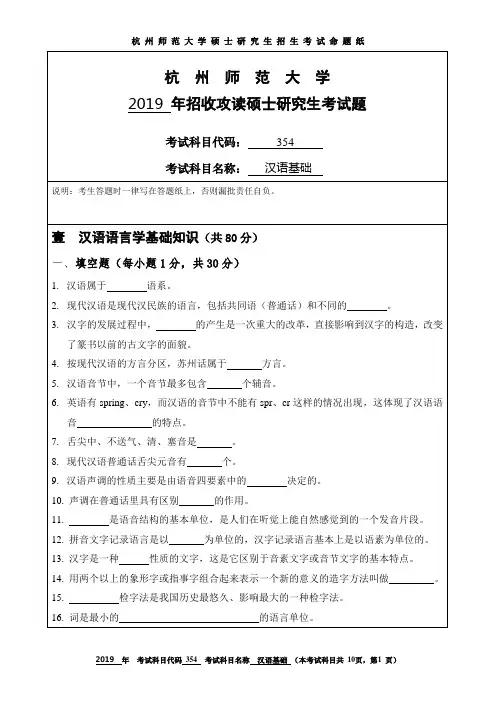
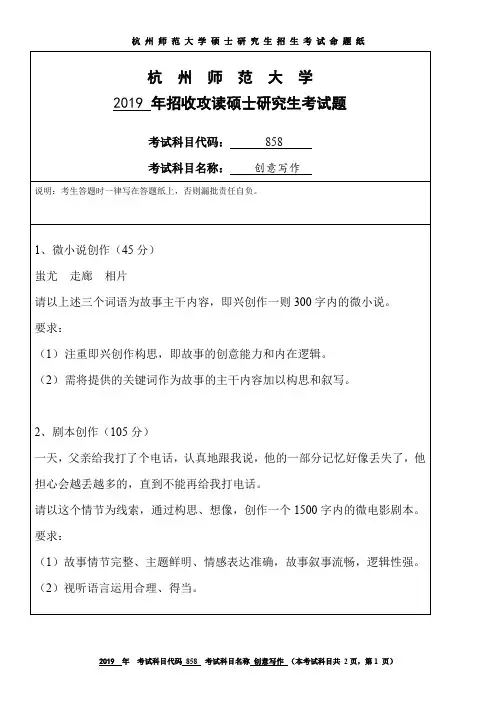
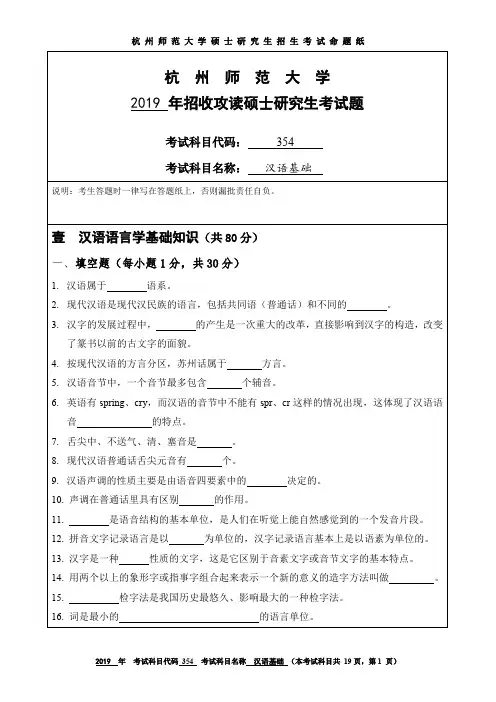
2020浙江杭州师范大学英语文学基础考研真题Part I Each of the statements below is followed by four alternative answers. Choose the one that would best complete the statement. (20x2)1. About the Renaissance humanists which of the following statements is true?A. They thought money and social status was the measure of all things.B. They emphasized the dignity of human beings and the importance of the worldly life.C. They couldn't see the importance of worldly happiness.D. They thought people were largely subordinated to the ruling class without any freedomand independence.2. Which of the following is not John Milton’s works?A. Paradise LostB. Paradise RegainedC. Samson AgonistesD. The Pilgrim’s Progress3. Jonathan Swift’s Gulliver’s Travels gives a n unparalleled_____ depiction of the vices of his age.A. religiousB. romanticC. satiricalD. comic4. William Blake’s Songs of Experience paints a world of _____ with a melancholy tone.A. misery, poverty, disease, war and repressionB. happiness and love and romantic idealsC. misery, poverty mixed with love and happinessD. loss and institutional cruelty with sufferings5. Through his poems, Byron created the “Byronic hero” who is _____.A. a brave and stubborn rebel figure of noble originB. a proud, mysterious rebel figure of noble originC. a proud, mysterious rebel figure of lower originD. a brilliant, independent and romantic figure of his time6. Which of the following can’t be included in the critical realists of the Victorian Period?A. Charlotte and Emily BronteB. Charles Dickens and William M. ThackerayC. Thomas Hardy and George EliotD. D. H. Laurence and James Joyce7. “Ode on a Grecian Urn” shows the contrast between the______ of art and the____ of human passion.A. glory,uglinessB. permanence, transienceC. transience,sordidnessD. glory,permanence8. The term “metaphysical poetry” is commonly used to name the work of the 17th century writers who wrote under the influence of _____.A. John MiltonB. John DonneC. John KeatsD. John Bunyan9. In The Pilgrim’s Progress Christian and Faithful come to the ______where bothare arrested as alien agitators and tried.A. Vanity FairB. Doubting CastleC. Celestial CityD. The Valley of Humiliation10. Of the following poets, who is not regarded as “lake poet”?A. Samuel Taylor ColeridgeB. Robert SoutheyC. William WordsworthD. John Keats11. ________, a Gothic novel written by Mary Shelley, is one of the triumphs of the Romantic movement due to its theme of alienation and its warning about the destructive power that can result when human activity is unfettered by moral and social concerns.A. WaverleyB. EndymionC. Joan of ArcD. Frankenstein12. Which of the following statements about the Romantic period in the history of American literature is NOT true?A. Most heroes and heroines in the writings of this period exhibited extremes of reason and rationality.B. In most of the writings of this period there was a new emphasis upon the imaginative and emotional qualities of literature.C. There were a strong tendency to exalt the individual and the common man.D. The writers of this period placed an increasing emphasis on the free expression of emotions and displayed an increasing attention to the psychic states of their characters.13. The common thread throughout American literature has been the emphasis on the___.A. revolutionismB. reasonC. individualismD. rationalism14. Although realism and naturalism were products of the 19th century, their final triumph came in the 20th century, with the popular and critical successes of such writers as Edwin Arlington, William Cather, Robert Frost, William Faulkner and_____.A. Edgar Allan PoeB. Sherwood AndersonC. Washington IrvingD. Ralph Ellison15. ____, one of the essays in The Sacred Wood, is the earliest statement of T.S. Eliot’s aesthetics, which provided a useful instrument for modern criticism. A. “Tradition and Individual Talent” B. “Sweeny Agonistes”C. “A Primer of Modern Heresy”D. “Gerention”16. The three poets Ezra Pound, T.S. Eliot and ____ opened the way to modern poetry.A. O. HenryB. Henry David ThoreauC. E.E. CummingsD. Robert Frost17. Which writer best expressed the Puritan sense of the self?A. Jonathan EdwardsB. Cotton MatherC. John SmithD. Thomas Hooker18. Which is generally regarded as the Bible of New England Transcendentalism?A. WaldenB. NatureC. “On Beauty”D. “S elf-Reliance”19. Which is regarded as the “Declaration of Intellectual Independence” in the history of American Literature?A. The American ScholarB. English TraitsC. The Conduct of LifeD. Representative Men20. Imagism was equivalent to ___ in fiction in a sense. Imagist never stated theemotion in the poem, but just presented an image: concrete, firm and definite in picture.A. modernismB. romanticismC. naturalismD. surrealismPart II Identify the source of each of the following quotation and write out the TITLE of which the passage comes from.(20x1)1. Whan Zephirus eek with his sweete breeth/Inspired hath in every holt and heeth/The tender croppes, and the Yonge sonne/Hath in the Ram his half coursy ronne,2. The quality of mercy is not strained;/It droppeth as the gentle rain from heaven/ Upon the place beneath. It is twice blest:3. If they be two, they are two so/As stiff twin compasses are two:/Thy soul, the fixed foot, makes no show/To move, but doth if th’other do;4. All is not lost-----the unconquerable will,/ And study of revenge, immoral hate,/And courage never to submit or yield:5. These people are most excellent mathematicians, and arrived to a great perfection in mechanics by the countenance and encouragement of the Emperor, who is a renowned patron of learning.6. True wit is Nature to advantage dressed,/What oft was thought, but ne’er so well expressed;7. So here have I lived above sixteen years in virtue and reputation; and all at once, when I come to know what is good, and what is evil, I must renounce all the good, all the whole sixteen years’ innocence, which, next to God’s grace, I owed chiefly to my parents and to my lady’s lessons and example.8. As fair art thou, my bonnie lass,/So deep in luve am I;/ And I will luve thee still, my dear,/ Till a’ the seas gang dry.9. No Nightingale did ever chaunt/ More welcome notes to weary bands/ Of travelers in some shady haunt,/ Among Arabian sands:10. It is a truth universally acknowledged, that a single man in possession of a good fortune must be in want of a wife.11. Wild Spirit, which art moving everywhere;/ Destroyer and Preserver; hear, O hear!12. He listened. The wind, playing upon the edifice, produced a booming tune, like the note of some gigantic harp.13. What a handsome little Oriental he was, and no doubt his wife and children were beautiful too, for people usually get what they already possess.14. This train of thought, she perceives, is threatening mere waste of energy, even some collision with reality, for who will ever be able to lift a finger against Whitaker’s Table of Precedency?15. He hated her bitterly at that moment because he made her suffer. Love her! She knew he loved her. He really belonged to her. This about not loving her, physically, bodily, was a mere perversity on his part.16. They were all running, all crying out madly. He could hear them crashing in the undergrowth and on the left was the hot, bright thunder of the fire.17. “I sometimes have a queer feeling with regard to you-----especially when you are near me, as now; it is as if I had a string somewhere under my left ribs, tightly and inextricably knotted to a similar string situated in the corresponding quarter of your little frame.”18. This grew; I gave commands;/ Then all smiles stopped together.19. Although schoolmistresses’ letters are to be trusted no more nor less than churchyard epitaphs; yet, as it sometimes happens that a person departs this life, who is really deserving of all praises the stone-cutter carves over his bones; 20. Yet all experience is an arch wherethrough/ Gleams that untraveled world whose margin fades/ Forever and forever when I move.Part III In this part, you are free to choose Any TWO of the following three literary terms, and define them. (20x2)1. Stream of consciousness2. Conceit3.TranscendentalismPart IV. Choose ONE of the two topics and elaborate your views. (25x1)1. In 1954, William Golding(1911-1993) published his first novel Lord of the Flies after nearly 21 rejections of various publishers. This fiction,since its publication, has been considered as a dystopian allegory indicative of vast aspects of the human condition, in terms of human evil and society.Elaborate your view on this novel.2. Eugene O’Neill(1888-1953) was the first American dramatist to regard the stage as a literary medium and the only American playwright ever to receive the Nobel Prize for Literature. Through his efforts, the American theatre grew up during the 1920s, developing into a cultural medium that could take its place with the best in American fiction, painting, and music. Elaborate your view on his works.Part V. Read the following two commentaries carefully and choose ONE topic to write out your own ideas in any relationship to the passage. (25x1)1. Poetry, as we have since learnt, has other tasks than that of imparting psychological values to the visible world. Had Wordsworth turned his attention toward these, his genius might not have atrophied so soon. It remains to indicate briefly, in conclusion, what gave Wordsworth his initial direction towards “Nature” as the inevitable raw material for his creative sensibility. Here we met, I think, with two other groups of beliefs current in his age, which may be said to have conditioned his poetic experi ence: postulates (‘doctrines-felt-as-facts’) without which his poetry would not have been what it actually is. The first was the product of the deistic tradition of the seventeenth and eighteenth centuries, to which I have already alluded in passing. Ever since the Renaissance the Creation had been steadily gaining in prestige as the ‘art of God,’ the universal divine Scripture which ‘liesexpans’d unto the eyes of all.’ The emotion of the‘numinous,’ formerly associated with super-nature, had become attached to Natureitself; and by the end of the eighteenth century the divinity, the sacredness of nature was, to those affected by this tradition, almost a first datum of consciousness. Wordsworth, then, did not have to construct this belief wholly out of his experience; much of it was given to him. Much the same is true of the second of these fundamental beliefs, the belief in the grandeur and dignity of man, and the holiness of the heart’s affections. This, too, was the products of forces originating (for our purposes) in the Renaissance; it had arisen out of the ruins of the theological view of man. As the ‘Fall’ receded further and further into the region of fable, man was increasingly regarded as a creature not only made in, but retaining, God’s image; and W ordsworth could acknowledge, without misgiving, ‘a grandeur in the beatings of the heart,’ and speak in good faith of ‘man and his noble nature.’ In Wordsworth’s lifetime this humanism had taken a colouring from Rousseau, and the special nobility of man was therefore only to be looked for ‘in huts where poor men lie.’ The ‘higher’ grades of society, in which the culture of the Renaissance had been exclusively fostered, were now “A light, a cruel, and vain world, cut off/From the natural inlets of just sentiment,/From lowly sympathy, and chastening truth.” [From “On Wordsworth and the Locke Tradition” by Basil Willey]2. Poetic influence is a labyrinthine process, and at its deepest is remote from echo and allusion, though it does not exclude them…When Whi tman tallies he takes measures of all things, implicitly including the measure of his own poetry. In his very different way, Whitman is as formalist a poet as were our late contemporaries James Merrill and Anthony Hecht, who usefully may be contrasted to the late A. R. Ammons and to John Ashbery, both of them strongly influenced by the poet of Leaves of Grass. Ammons and the versatile Ashbery can be far freer in form than Whitman ever is. The King James Bible is the largest influence upon Whitman’s style, a nd the Hebrew parallelism breaks through in the strongest of the translators, William Tyndale and Miles Coverdale. There is no single measure to Whitman’s song, just as his huge enlargements transcend all previous notions as to what can constitute materiapoetica. To hold together the vastness of his topics and the fluid dissolves of his tropes Whitman had to discover a master metaphor and found it in the tally, at once his ‘confession sprig’ and his incanted warbles for lilac-time. The Whitmanian tally is t he binding agent for “When Lilacs last in the Door-yard Bloom’d,” the sonorous elegy for the martyred Abraham Lincoln. Together with “As I Ebb’d with the Ocean of Life,” “Lilacs” is the most formally measured of Whitman’s peoms. I have a passion for “Lilacs,” though the epic “Song of Myself” is certainly the center of the Whitmanian poetic cosmos. Henry and William James, T. S. Eliot(belatedly), and W allace Stevens all associated “Out of the Cradle Endlessly Rocking” with “Lilacs” because there is a clear affinity between the mockingbird’s song and the song of death warbled by the hermit thrush. The boy Whitman first beholds the mockingbird “when the l ilac-scent was in the air.” The crucial difference between “Out of Cradle” and “Lilacs” seems to me that the sea in the first poem lisps the low and delicious word death, which becomes the burden of hermit thrush’s song in “Lilacs.” In the earlier poems, t he male mockingbirdsings of bereavement but not of death, though that is implied. Why did Whitman choose the word tally for what I judge to be his comprehensive vision of poetic voice? The word has a curious history. It derives from the Latin talea, which means a cutting, rod, or stick, on which you record payments and the sum still owed. In English, it transmuted into the idea of a duplicate or other half. It then became associated with illicit love. To live “tally” was to dwell together without marriage.In time the word expanded to become tally-whacking, tally woman, and tally-wags. [From The Anatomy of Influence: Literature as a Way of Life by Harold Bloom]。
起偌大的身驱来,他那许多只腿真是细得可怜,都在他眼前无可奈何地舞动着。
“我出了什么事啦?”他想。
这可不是梦。
他的房间,虽是嫌小了些,的确是普普通通人住的房间,仍然安静地躺在四堵熟悉的墙壁当中。
在摊放着打开的衣料样品——萨姆沙是个旅行推销员——的桌子上面,还是挂着那幅画,这是他最近从一本画报上剪下来装在漂亮的金色镜框里的。
画的是一位戴皮帽子围皮围巾的贵妇人,她挺直身子坐着,把一只套没了整个前臂的厚重的皮手筒递给看画的人。
格里高尔的眼睛接着又朝窗口望去,天空很阴暗——可以听到雨点敲打在窗槛上的声音——他的心情也变得忧郁了。
“要是再睡一会儿,把这一切晦气事统统忘掉那该多好。
”他想。
但是完全办不到,平时他习惯于向右边睡,可是在目前的情况下,再也不能采取那样的姿态了。
无论怎样用力向右转,他仍旧滚了回来,肚子朝天。
他试了至少一百次,还闭上眼睛免得看到那些拼命挣扎的腿,到后来他的腰部感到一种从未体味过的隐痛,才不得不罢休。
“啊,天哪,”他想,“我怎么单单挑上这么一个累人的差使呢!长年累月到处奔波,比坐办公室辛苦多了。
再加上还有经常出门的烦恼,担心各次火车的倒换,不定时而且低劣的饮食,而萍水相逢的人也总是些泛泛之交,不可能有深厚的交情,永远不会变成知己朋友。
让这一切都见鬼去吧!”他觉得肚子上有点儿痒,就慢慢地挪动身子,靠近床头,好让自己头抬起来更容易些;他看清了发痒的地方,那儿布满着白色的小斑点,他不明白这是怎么回事,想用一条腿去搔一搔,可是马上又缩了回来,因为这一碰使他浑身起了一阵寒颤。
他又滑下来恢复到原来的姿势。
“起床这么早,”他想,“会使人变傻的。
人是需要睡觉的。
别的推销员生活得像贵妇人。
比如,我有一天上午赶回旅馆登记取回定货单时,别的人才坐下来吃早餐。
我若是跟我的老板也来这一手,准定当场就给开除。
也许开除了倒更好一些,谁说得准呢。
如果不是为了父母亲而总是谨小慎微,我早就辞职不干了,我早就会跑到老板面前,把肚子里的气出个痛快。
那个家伙准会从写字桌后面直蹦起来!他的工作方式也真奇怪,总是那样居高临下坐在桌子上面对职员发号施令,再加上他的耳朵又偏偏重听,大家不得不走到他跟前去。
但是事情也未必毫无转机;只要等我攒够了钱还清了父母欠他的债——也许还得五六年——可是我一定能做到。
到那时我就会时来运转了。
不过眼下我还是起床为妙,因为火车五点钟就要开了。
”
他看了看柜子上滴滴嗒嗒响着的闹钟。
天哪!他想到。
已经六点半了,而时针还在悠悠然向前移动,连六点半也过了,马上就要七点差一刻了。
闹钟难道没有响过吗?从床上可以看到闹钟明明是拨到四点钟的;显然它已经响过了。
是的,不过在那震耳欲聋的响声里,难道真的能安宁地睡着吗?嗯,他睡得并不安宁,可是却正说明他睡得不坏。
那么他现在该干什么呢?下一班车七点钟开;要搭这一班车他得发疯似的赶才行,可是他的样品都还没有包好,他也觉得自己的精神不甚佳。
而且即使他赶上这班车,还是逃不过上司的一顿申斥,因为公司的听差一定是在等候五点钟那班火车,这时早已回去报告他没有赶上了。
那听差是老板的心腹,既无骨气又愚蠢不堪。
那么,说自己病了行不行呢?不过这将是最不愉快的事,而且也显得很可疑,因为他服务五年以来没有害过一次病。
老板一定会亲自带了医药顾问一起来,一定会责怪他的父母怎么养出这样懒惰的儿子,他还会引证医。